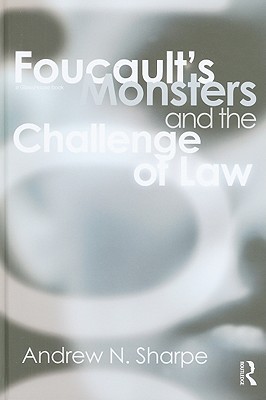
- We will send in 10–14 business days.
- Author: Alex Sharpe
- Publisher: Routledge-Cavendish
- ISBN-10: 0415430313
- ISBN-13: 9780415430319
- Format: 15.5 x 23.4 x 2 cm, kieti viršeliai
- Language: English
- SAVE -10% with code: EXTRA
Reviews
Description
In contrast to other figures generated within social theory for thinking about outsiders, such as Rene Girard's 'scapegoat' and Zygmunt Bauman's 'stranger', Foucault's Monsters and the Challenge of Law suggests that the figure of 'the monster' offers greater analytical precision and explanatory power in relation to understanding the processes whereby outsiders are constituted.
The book draws on Michel Foucault's theoretical and historical treatment of the category of the monster, in which the monster is regarded as the effect of a double breach: of law and nature. For Foucault, the monster does not simply refer to a particular kind of morphological or psychological irregularity; for the body or psyche in question must also pose a threat to the categorical structure of law. In chronological terms, Foucault moves from a preoccupation with the bestial human in the Middle Ages to a concern over Siamese or conjoined twins in the Renaissance period, and ultimately to a focus on the hermaphrodite in the Classical Age. But, although Foucault's theoretical framework for understanding the monster is affirmed here, this book's study of an English legal history of the category 'monster' challenges some of Foucault's historical claims.
In addition to considering this legal history, the book also addresses the contemporary relevance of Foucault's theoretical framework. Structured around Foucault's archetypes and the category crises they represent - admixed embryos, conjoined twins and transsexuals - the book analyses their challenge to current distinctions between human and animal, male and female, and the idea of the 'proper' legal subject as a single embodied mind. These contemporary figures, like the monsters of old, are shown to threaten the rigidity and binary structure of a law that still struggles to accommodate them.
EXTRA 10 % discount with code: EXTRA
The promotion ends in 21d.22:04:21
The discount code is valid when purchasing from 10 €. Discounts do not stack.
- Author: Alex Sharpe
- Publisher: Routledge-Cavendish
- ISBN-10: 0415430313
- ISBN-13: 9780415430319
- Format: 15.5 x 23.4 x 2 cm, kieti viršeliai
- Language: English English
In contrast to other figures generated within social theory for thinking about outsiders, such as Rene Girard's 'scapegoat' and Zygmunt Bauman's 'stranger', Foucault's Monsters and the Challenge of Law suggests that the figure of 'the monster' offers greater analytical precision and explanatory power in relation to understanding the processes whereby outsiders are constituted.
The book draws on Michel Foucault's theoretical and historical treatment of the category of the monster, in which the monster is regarded as the effect of a double breach: of law and nature. For Foucault, the monster does not simply refer to a particular kind of morphological or psychological irregularity; for the body or psyche in question must also pose a threat to the categorical structure of law. In chronological terms, Foucault moves from a preoccupation with the bestial human in the Middle Ages to a concern over Siamese or conjoined twins in the Renaissance period, and ultimately to a focus on the hermaphrodite in the Classical Age. But, although Foucault's theoretical framework for understanding the monster is affirmed here, this book's study of an English legal history of the category 'monster' challenges some of Foucault's historical claims.
In addition to considering this legal history, the book also addresses the contemporary relevance of Foucault's theoretical framework. Structured around Foucault's archetypes and the category crises they represent - admixed embryos, conjoined twins and transsexuals - the book analyses their challenge to current distinctions between human and animal, male and female, and the idea of the 'proper' legal subject as a single embodied mind. These contemporary figures, like the monsters of old, are shown to threaten the rigidity and binary structure of a law that still struggles to accommodate them.


Reviews